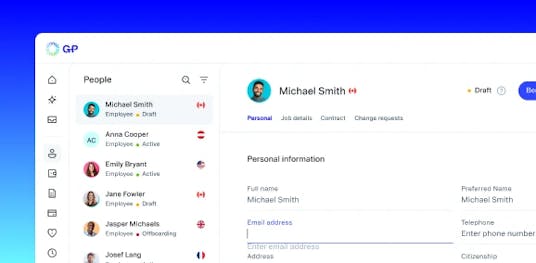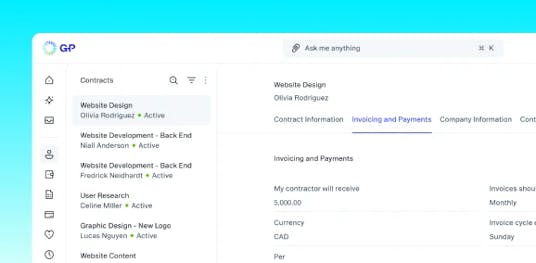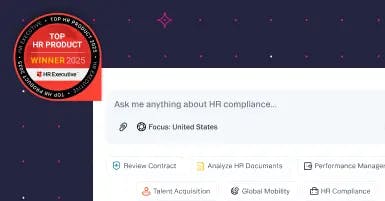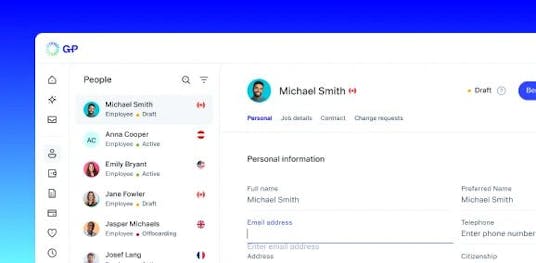Equity compensation can be a powerful way to attract and retain talent. It incentivizes potential employees to work with you long term. Equity offers a high-value incentive without straining your cash flow, allowing you to compete against more established companies.
This article discusses how compensation through equity works, what you can do to offer such benefits, and how an employer of record (EOR) like G-P™ can help.
What is equity compensation?
Equity compensation offers employees company ownership through stock options, restricted stocks, phantom stocks, or other alternatives. It motivates employees to contribute to your long-term growth, since they have a stake in its success.
Public and private companies offer equity. This form of compensation can help global businesses attract top talent. According to the National Association of Stock Plan Professionals (NASPP), 97% of U.S. multinational public companies offer equity to their global teams.

Why offer equity to employees
An equity package creates mutual value for global employers and employees by:
-
Boosting engagement and buy-in: The equity value is based on your company’s market value or stock price. It gives employees extra motivation to excel when their benefits are tied to your company’s success. Unlike fixed cash bonuses, there’s no ceiling to how much employees can gain.
-
Attracting and retaining top international talent: Employers offering equity gain a competitive edge in attracting top talent. It can make job offers more appealing by adding value beyond salary. Equity is earned over time, so it also encourages long-term employment.
-
Offering cost-effective rewards for startups and growing companies: Equity compensation can balance lower cash pay. Startups or growing companies can complement their salary structure with the potential of future gains, giving them an advantage against more established competitors.
Types of equity compensation for global employees
Some forms of equity compensation are more suitable than others, depending on your company’s capacity and local regulations. The common types for global employees include:
-
Stock options: Stock options let employees buy company shares at a set price after a specified time. You can offer an incentive stock option (ISO) or a nonqualified stock option (NSO), which vary in tax incentives. Global employees hired through an EOR can be eligible for NSOs. ISOs are limited to U.S. employees under U.S. tax law.
-
Restricted stock units (RSUs): An RSU is a commitment to grant shares at a future date or specific milestone. For instance, you may require employees to stay with you for a year and achieve a performance milestone before they get an RSU. Unlike stock options, employees won’t need to buy the shares — shares are awarded to them.
-
Stock appreciation rights (SARs): SARs are bonuses paid in cash or through shares. Employees get the right to receive the increase in monetary value of your company’s stock within a specified time. Like RSUs, employees don’t need to buy shares with SARs.
-
Phantom stocks: Phantom stock is a promise to pay employees bonuses in the future with a value equivalent to the increase in value of the company stock or the full value of the entire stock. Unlike RSUs and SARs, employees don’t get the actual share of your company.
-
Warrants: Warrants, suitable for Nordic countries, function similarly to stock options. With warrants, employees have the right, but not the obligation, to buy the shares at a set price after a specific time. Warrants have premiums, which are a percentage of the share price. Employees must also pay this small fee to get the right to buy the shares.
-
Performance shares: Performance shares are a form of equity compensation given to employees once they meet certain metrics. For instance, you may set an earnings per share (EPS) or return on equity (ROE) target. Performance periods usually last for multiple years.
Global tax and regulatory compliance in equity compensation
You can offer global share equity benefits in most countries. However, you must understand its tax implications to avoid penalties and comply with varying jurisdictions. Here’s what you can do:
-
Research local laws and tax rules: First, you must research your tax responsibilities in your target countries. G-P Gia™, our AI-powered global HR agent, can provide up-to-date information on statutory requirements, tax implications, and reporting obligations for equity compensation, like stock options and RSUs, in specific countries. Use this information to guide employees on their obligations and entitlements to ensure compliance and maximize the incentive. For instance, RSUs in the U.S. require withholding and remitting Federal Insurance Contributions Act (FICA) taxes and Medicare taxes. The income must also be equivalent to the fair market value of shares at settlement.
-
Review plan documents for employee eligibility language: When creating the terms for your equity plan, make sure it offers fair opportunities, where all targeted employees can participate. Employees should fully understand what's needed, when they can purchase the shares, and how they can sell them. Private companies have limited means of selling compared to public companies.
-
Comply with country-specific regulations: Each country has differing regulations for equity compensation. For instance, the EU Prospectus Regulation requires you to issue a prospectus when you offer securities to employees. This document contains your company information, finances, rights attached to the securities, and your reasons for offering them. In Brazil, stock options are treated as compensation, so they’re subject to income tax and social contributions when exercised and capital gains tax when sold. Noncompliance can have legal and financial consequences.
-
Access local compliance expertise through an EOR: An EOR simplifies all aspects of global employment. Use G-P EOR to generate compliant employment contracts and administer locally competitive benefits in 180+ countries. G-P EOR also offers other HR support features, such as payroll management and benefits analysis, making it easy to manage your global team.
How to offer global equity compensation
Here’s how you can offer competitive compensation through equity benefits:
-
Understand local regulations and consult experts: Experts help you learn your target country’s employment, securities, and tax laws. Careful planning helps you avoid noncompliance penalties, double taxation, and lawsuits.
-
Create a unified, competitive, and clear plan: Use simple and clear language so employees fully understand the value and terms of their awards. A unified plan across regions prevents confusion from differing local policies. For global talent, competitiveness is about offering fair, transparent, and meaningful terms in every market.
-
Choose the right equity type for each jurisdiction and employment model: Think about where and how you operate when selecting the right equity. For instance, remote employees through an EOR typically can’t opt for ISOs. You can offer NSOs or RSUs instead.
-
Collaborate with your EOR for setup and administration: EORs help you manage your global workforce through payroll,tax, and benefits support.
-
Educate employees and communicate milestones, vesting, and tax events: Employees should understand how they can benefit from your equity package. Work with your EOR to inform employees of key milestones and time frame requirements, and explain how they can receive assistance regarding tax filings.
Streamline equity compensation with G-P
G-P is your partner in global employment. We handle everything from payroll to compliance, so you can focus on scaling your business and building your team. We make it quick and easy to hire anyone, anywhere. With us, you can build and manage global teams in 180+ countries, without setting up entities. We can help you create a competitive benefits package, including equity compensation, while complying with local labor laws.
Contact us to learn more about our global employment products and EOR solutions or book a demo today.





















